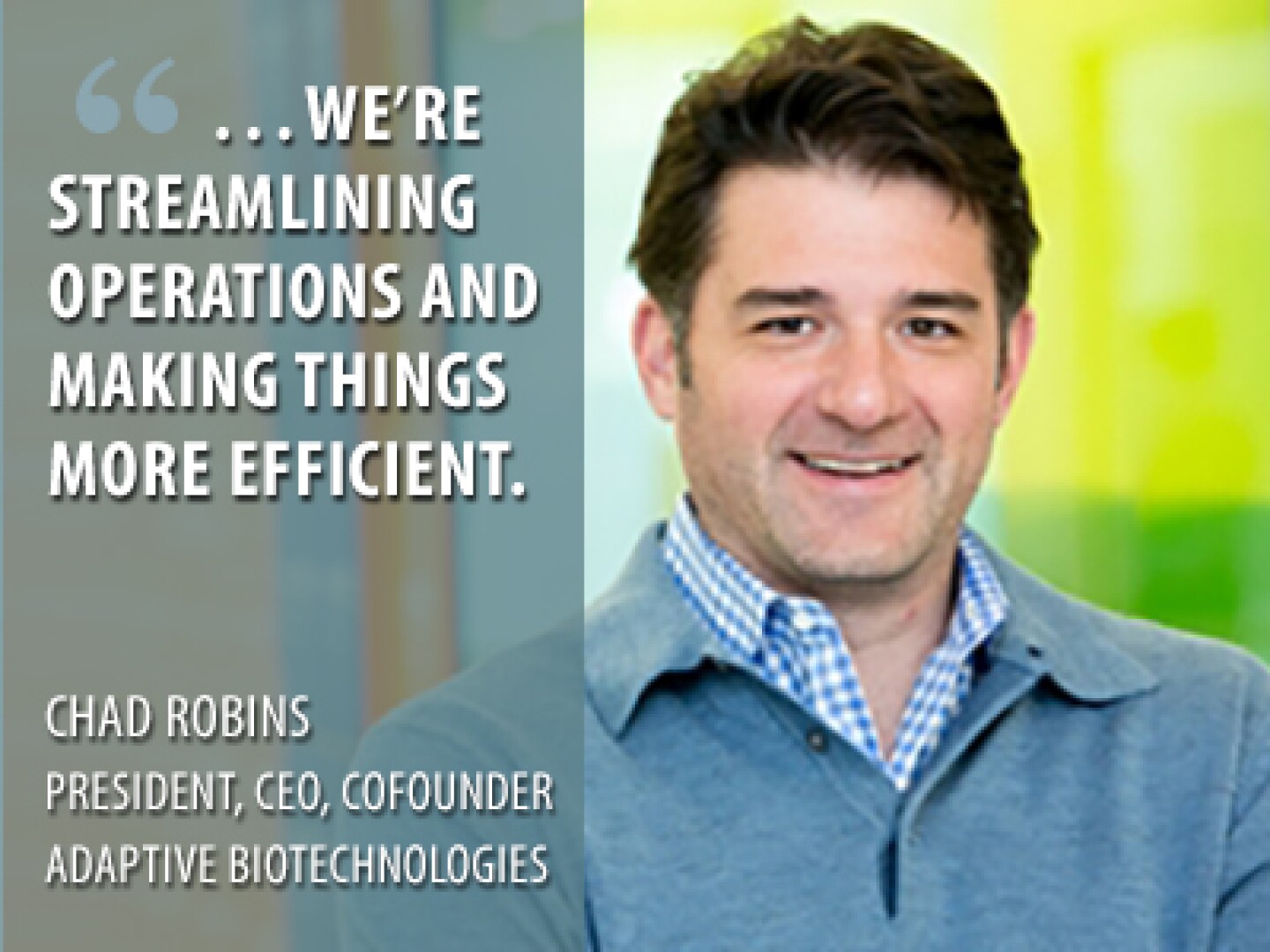April 26, 2016
By Alex Keown, BioSpace.com Breaking News Staff
SEATTLE – The rest of 2016 might be considered a little less hectic for Adaptive Biotechnologies as it streamlines its operations to support some big moves the company made over the past year.
At least, that’s how Adaptive’s president Chad Robins described the situation during an exclusive interview with BioSpace . During the interview he highlighted some of the changes the company underwent during 2015, including the launch of a new division, Adaptive Therapeutics.
“2016 is a year we’re focused on putting in a lot of operational excellence, process improvements, automation and software improvements at Adaptive Biotech,” Robins said. “It seems a bit boring, but we’re streamlining operations and making things more efficient.”
But, that operational excellence is necessary to support the changes the company made the previous year.While Robins said 2016 may be a bit slower, he did say the company is likely to continue hiring at a strong pace, with a possible target of about 300 employees by year’s end, an increase of about 50 employees.
Adaptive Therapeutics
Last year, Adaptive Biotechnologies launched a new division, Adaptive Therapeutics, to develop drug therapies based on Adaptive’s cellular sequencing discovery for treatment of cancer and infectious diseases. The new division will allow Adaptive to harness its immunosequencing platform to pair DNA chains at a high frequency and see what antigens they are binding to in order to determine what diseases the company should target. In short, the company is looking to use its technology to unlock the immune system to best fight disease.
“That’s the task of Adaptive Therapeutics, to apply these technologies that we built and figure out where to point the guns,” Robins said.
However, Robins and company remain tightlipped, at least for now, on what those targets may be.
The company launched its new drug division on the back of a new cellular sequencing that pairs T-cell receptor (TCR) alpha and beta chain sequences at high throughput. The company’s new sequencing technology, called pairSEQ Assay, enables highly accurate, rapid and scalable pairing of up to hundreds of thousands of TCR alpha or beta sequences in a single experiment and can be applied to the process of therapeutic discovery, including the identification of highly promising TCRs for adoptive T-cell therapy, the company said. A T Cell is one of the body’s first lines of defense against pathogens. It is a type of white blood cell at the core of adaptive immunity.
To helm Adaptive Therapeutics, the company tapped former Johnson & Johnson executive Diego Miralles as president of its new San Diego-based Adaptive Therapeutics division. Miralles, an infectious disease specialist, comes to Adaptive after more than a decade at Johnson & Johnson where he helped the company launch its satellite business incubator programs, such as JLabs and the Johnson & Johnson Innovation Center.
Big Financing
In May 2016, Adaptive Biotechnologies raked in $195 million in financing, led by Matrix Capital Management. That round of funding came after a spate of funding rounds that provided more than $400 million to the company. Its May financing round was the largest in the Pacific Northwest at the time. During that quarter, biotech companies in the region raised $381 million, and Adaptive made up more than half of it.
Robins said the financial boon would be used to, at least in part, finance the launch of Adaptive Therapeutics and the expansion of its immunosequencing platform to develop target identification technology for adoptive T-cell therapy.
New CFO
In August 2015 Adaptive Biotechnologies tapped Chad Cohen, formerly of the online real estate company Zillow, as its new chief financial officer. The move was part of an effort to solidify the company’s financial infrastructure and hire someone with a strong business intelligence who can help with “solid decision making.”
During his nine years at Zillow, Cohen oversaw nine acquisitions as well as helped take the company public. However, Robins said there is currently no timeline for Adaptive to become a publicly traded company. He said the company’s focus is to ensure there is strong science backing up its technology and have strong business practices in place.
“I wanted to bring in a CFO who had IPO experience who could help us put in sound accounting practices that are necessary. But, at this time we’re focused on putting in operational excellence and right now we’re not looking for public partners,” Robins said.
Holding off on an IPO at this time may also be a calculated move based on how poorly the biotech market has performed this year with several companies that have already gone public since Jan. 1 trading below their IPO prices.






